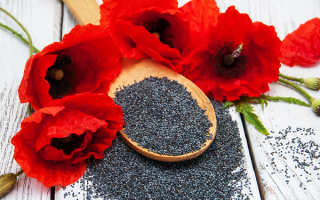Content
- 1 What is this plant
- 2 The chemical composition and calorie content of poppy
- 3 Health Benefits of Poppy Seeds
- 4 Is it possible poppy for pregnant and lactating women
- 5 How old can children be with poppy
- 6 Preparations with poppy alkaloids
- 7 The use of poppy in traditional medicine
- 8 Poppy in home cosmetology
- 9 Poppy oil: beneficial properties and uses
- 10 The benefits of poppy milk
- 11 Poppy seeds in cooking
- 12 Poppy harm and contraindications
- 13 Conclusion
Poppy is a unique flower. Its properties were known to the ancient Romans. The benefits and harms of poppy depend on the way it is consumed. The plant helps to cope with a number of diseases. However, some parts of this flower can be very dangerous as they have a narcotic effect. Therefore, its free cultivation is prohibited and controlled by special services. Despite this, poppy is widely used in cosmetology, medicine and cooking.

What is this plant
Poppy is the oldest flower known since the Neolithic era. Then it was used as a sleeping pill, and among Catholics it is still a symbol of peace. On holidays they make poppy wreaths to decorate the sacred abodes.
During the Middle Ages, the opium properties of the flower were studied by healers who wanted to determine the benefits of poppy for the body. It has been used to relieve headaches and diseases of the digestive system, as well as an anthelmintic, expectorant and anti-inflammatory agent. Poppy seeds were present on royal tables as a condiment.
In the East, poppy was used to treat joints and bruises. Poppy decoction has been able to treat fever and skin diseases.
Already in the 16th century, doctors recommended the use of poppy within reasonable limits, because the harm of the opium effect was also known to them.
Poppy seeds contain a lot of nutrients. They are harmful only in an immature state, since they contain a lot of alkaloids. Seeds are almost half fat, so their calorie content is very high.
For thousands of years, many varieties of poppy have been cultivated, which are classified according to chemical composition and other characteristics. There are more than 100 varieties, each of which, according to scientists, is an opium crop. However, the benefits of poppy are so huge that they cover this disadvantage and possible harm.
The chemical composition and calorie content of poppy
Useful properties are determined by the valuable composition:
- vitamins of group B, vitamins C and E;
- large amounts of calcium;
- phosphorus;
- magnesium;
- zinc;
- iron;
- potassium;
- copper;
- selenium;
- iodine;
- betaine;
- choline;
- cellulose;
- 18 essential amino acids.
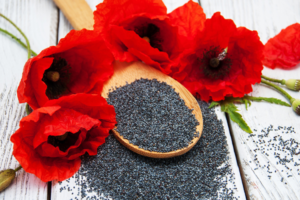
Vegetable fats occupy 1/2 of the total composition. The calorie content of poppy per 100 grams is 520-556 kcal. This is a very high figure, so you can get a lot of energy from it, but people on a diet need to monitor the amount of consumption.
Poppy energy value:
|
Protein |
≈18 |
|
Fats |
≈42 |
|
Carbohydrates |
≈ 28 |
Health Benefits of Poppy Seeds
The health benefits of edible poppy are extremely high, as it contains a large percentage of nutrients that are easily absorbed by the body. They have such beneficial effects as:
- Anesthetic effect.
- Preservation of visual acuity (thanks to antioxidant compounds).
- Increased energy reserves.
- Prevention of anemia (due to the high iron content).
- Improving digestion (with fiber).
- Maintaining the health of the nervous system (calcium, B vitamins).
- Improving immunity (zinc).
- Strengthening bones (calcium).
- Reducing blood pressure and cholesterol levels, preventing atherosclerosis, strengthening the heart and blood vessels (potassium, magnesium, oleic acid, Omega-3, Omega-6).
- Prevention of cancer (oleic acid).
- Preventing the formation of kidney stones (potassium).
- Improves metabolism.
- Relieves coughing and heavy breathing.
- Fights insomnia.
When used carefully and after consultation with a specialist, poppy can be beneficial even for diabetes.
Is it possible poppy for pregnant and lactating women
With reasonable consumption, poppy seeds only benefit the child and the expectant mother. It will compensate for the lack of essential micronutrients, as well as help relieve stress. One bun with poppy seeds will be enough. However, excessive consumption contributes to the development of heart and respiratory diseases in the fetus. Therefore, it is imperative to discuss this issue with your doctor.
During lactation, poppy seeds are allowed only in reasonable quantities. In this case, you need to monitor the reaction and condition of the baby. If he develops allergies or colic, the plant should be immediately removed from the diet.
How old can children be with poppy
It is recommended to include poppy in a child's diet no earlier than from 2 years old, since it is difficult for a small organism to absorb. When bronchitis and severe coughing occur, it is useful to give children poppy milk. In addition to medicinal properties, it can provide a child with sound sleep during illness.
Preparations with poppy alkaloids
Since the 19th century, they began to produce preparations containing morphine. Due to their pharmacological properties, they have treated cough and pneumonia. Then it became clear that they can be harmful, causing addiction, so their production was stopped.
Some derivatives of opium alkaloids are still in use today. The most popular are codeine and papaverine. The first is part of pain relievers, sedatives and cough-soothing drugs. The second helps to relax muscles and improve blood circulation in the brain.
The use of poppy in traditional medicine
Since ancient times, folk medicine has taken into account not only the health benefits of poppy seeds, but also all parts of this flower.
A decoction of seeds helps relieve fatigue, toothache and ear pain, softens coughs, and improves digestion. It fights diarrhea, colic, dysentery, inflammation of the kidneys and pancreas. The infusion helps with insomnia and nervous disorders. To prepare it, you need to pour 5-10 g of seeds with a glass of boiling water and wait for it to cool. Then strain and take 1 tablespoon several times a day. To eliminate insomnia, honey should be added to the infusion.
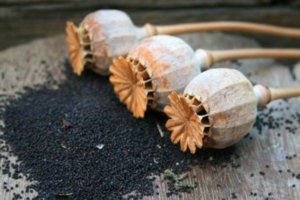
The leaves are used as a tonic for fever. They also help fight warts. Compresses are made with steamed leaves to eliminate bruises and pain in the joints.
Decoction of roots relieves headaches. Poppy's anthelmintic property is also known. You need to insist a tablespoon of seeds for 20 minutes in warm milk and use once a day for a week.
Alcohol tincture is made from poppy petals to treat coughs, mouth ulcers, insomnia and fatigue. For its preparation, the petals are kept in vodka for about two weeks.
Parts of poppy boiled in oil have long been used to cleanse and restore the liver (5 drops per day).
It must be remembered that poppy can bring not only benefits, but also harm to health. Therefore, you should not get too carried away with them.
Poppy in home cosmetology
Due to its beneficial properties, poppy is widely used in home cosmetology and is even present in some cosmetics. In this form, it is absolutely harmless, if we are not talking about individual intolerance.
For skin
Poppy petals and seeds are used to make homemade masks and skin lotions that:
- moisturize;
- soften;
- slow down aging;
- soothe;
- restore cellular metabolism.
High efficiency is explained by the content of useful acids (oleic, palmitic, linoleic and others). The plant is used to treat various inflammations, itching and even eczema. For this, poppy seeds are soaked in water or milk. Lime juice and many other ingredients can be added to enhance the effect of the mixture.
Poppy seeds and cottage cheese can be used to make a wonderful face and body scrub.
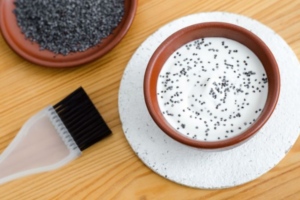
Poppy milk helps to remove bruises and circles under the eyes.
An infusion of petals and plant seeds is used as a lotion.
For hair
Poppy seeds can help get rid of dandruff. To create such a healing composition, they are soaked in water and white pepper and cottage cheese are added. The mass is applied to the roots and washed off thoroughly after 30 minutes. And if you soak poppy seeds in coconut water, you get hair growth products. Moreover, it is used to treat weak and split ends.
Poppy oil: beneficial properties and uses
The beneficial properties of poppy oil were already known to the ancient Greeks. It includes:
- Omega-6;
- Omega-9;
- stearic acid;
- vitamins (B1, B2, P, E);
- alkaloids.
Due to this beneficial composition, poppy seed oil is often used in medicine. It normalizes the work of muscles, cardiovascular and nervous systems, relieves headaches and stress, fights insomnia, skin and oncological diseases, strengthens the body. To do this, take a teaspoon after meals. It can also form the basis for therapeutic massage.
Poppy seed oil is also used in cooking. It is used for frying, it is seasoned with healthy salads and other dishes.
In cosmetology, poppy seed oil is considered the most valuable product that suits any skin type. It has an anti-aging effect, moisturizes, improves skin elasticity, and cares for the skin around the eyes. In addition, the oil has a beneficial effect on the condition of hair and nails. They are enriched with shampoos and balms or used as an independent remedy, often in combination with other oils, enhancing their beneficial properties.
The benefits of poppy milk
Poppy milk is made from seeds that are not fully ripe. This drink is a valuable source of protein, satisfies hunger well and provides a lot of energy, which is especially important for vegetarians. It also contains nearly 5 times more calcium than cow's milk, highlighting its benefits.
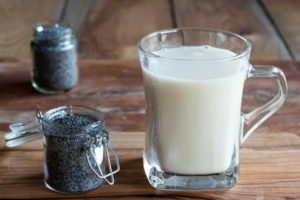
In folk medicine, poppy milk is used for:
- normalization of sleep;
- suppressing stress;
- fight against helminths;
- treatment of gastrointestinal diseases and inflammation of the bladder;
- getting rid of cough and bronchitis;
- increasing immunity;
- fight against hemorrhoids;
- elimination of skin problems.
The milk should be taken immediately after preparation. It's best to do this before bed. You can store it in the refrigerator for no more than a day.
To use poppy seed milk for good, you need to be careful, as it can be addictive, which will bring considerable harm to the body.
Poppy milk recipe
Poppy milk can be prepared according to the following scheme:
- Wash with 150 g of poppy seeds.
- Cover with water overnight.
- Beat in a blender, gradually pouring in 500 ml of water.
- You can add honey or dates as a sweetener, or spice to taste.
- Strain.
To saturate the body with the necessary substances with benefit, you should drink a glass of such milk a day. It can be used as an ingredient in smoothies, teas, cocktails, and various dishes.
The remaining seeds are used for baking, eaten with honey, or used as a scrub.
Poppy seeds in cooking
The benefits of confectionery poppy are highly appreciated by culinary experts.It is especially often used as a topping or filling for baked goods. Oriental sweets, Indian curry sauce and traditional dishes of many nations are made from it. Poppy is versatile, as it is stored for a very long time and goes well with a large number of dishes and sauces. It gives them a spicy, sweet taste with a slightly nutty flavor.
To make the seeds soft, they are poured with boiling water for a couple of hours, and then passed through a meat grinder. It is also useful to add grains to fermented milk products.

Poppy harm and contraindications
In some cases, poppy can cause serious harm. It rarely causes allergies, but if abused, addiction and even opium poisoning are possible. Therefore, preparations with its content should be taken only under the supervision of a specialist so as not to harm the body.
Poppy's contraindications include:
- individual intolerance;
- age under 2 and after 60 years;
- alcohol addiction;
- heart failure;
- cholelithiasis;
- constipation;
- lung disease;
- liver disease.
Also, do not forget about the high calorie content of poppy, which can also harm the body.
Conclusion
The benefits and harms of poppy should be carefully studied before using it, as it is a very controversial product. Many fear addiction due to the plant's narcotic properties. But mature seeds contain only beneficial alkaloids and nutrients. Therefore, poppy has many more advantages than disadvantages. When used correctly and in moderation, the plant is only beneficial.

